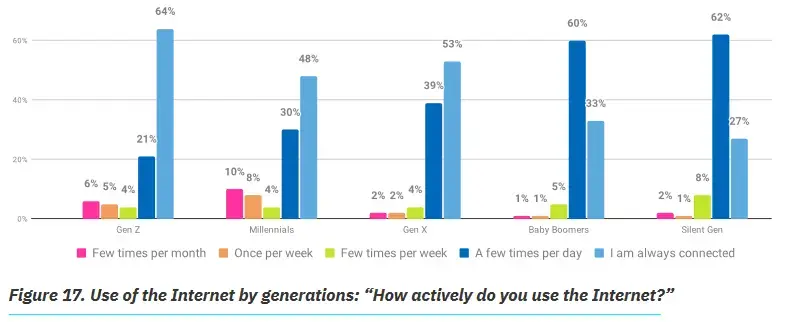Hm, like most opinion pieces, there aren’t any hard numbers from studies really shown besides the initial percentages. And I immediately picked up on the second paragraph’s
Compared to older generations, younger generations have reported higher rates of victimization in phishing, identity theft, romance scams, and cyberbullying.
Yeah no shit those metrics will skew towards Gen Z being more victimized if you’re lumping cyberbullying into the mix! They’re one of the first generations that have had to deal with their peers harassing the everloving shit out of them all hours of the day online. As a millennial, I didn’t have to even think about putting up with that until at least high school. I’d really want to see what questionnaire wording they were using for the survey data. If the question was legitimately “Have you ever been a victim of phishing, identity theft, romance scams, or cyberbullying?” then I think almost everyone with a social media account for their whole life would need to check “yes.”
Self reporting is also notoriously unreliable
I also wonder if they controlled for the fact younger people are online more often in the first place.
Yeah no shit those metrics will skew towards Gen Z being more victimized if you’re lumping cyberbullying into the mix!
They’re high in each of those categories individually, not (just) if you add the categories together and compare the totals. Millennials are slightly higher in Romance scams and identify theft though.
BUT these numbers are also self-disclosed. I’m not sure how you’d correct for this in a survey, but I could easily believe that these two generations are simply more likely to realize they’ve been victimized, and have a higher exposure to the internet (and thus to scams).
I’d be more interested in something like a sit-down test, to be honest. It’d be easier to account for time spent online and self-awareness of victimization, and more likely to isolate “internet street smarts”, as far as I can tell.
Considering what the boomers and Gen x have put the millennials through, I’m not surprised they’re susceptible to romance scams.
We just want to be loved.
Also worth considering with self-report that Gen Z may just be more open about their failings
Stupid article, most of Gen Z aren’t even 21 yet, of course they’re gonna fall for scams, they’re teenagers or younger lol. I got scammed loads of times on RuneScape as a kid, and that taught me better than anything else how to avoid scams.
Buying gf
The headline is pretty misleading. Reading the headline, I was imagining Nigerian Prince scams. But in the article, they state “Compared to older generations, younger generations have reported higher rates of victimization in phishing, identity theft, romance scams, and cyberbullying.”
Teens get bullied more than the elderly? Say it ain’t so!
While GenZ is, according to their source, also the generation with the highest percentage of victims if phishing scams, it’s actually millenials that fall for identity theft and romance scams the most.The article also states that the “cost of falling for those scams may also be surging for younger people: Social Catfish’s 2023 report on online scams found that online scam victims under 20 years old lost an estimated $8.2 million in 2017. In 2022, they lost $210 million.”
The source for Social Catfish’s claim is data released in 2023 by the FBI Internet Crime Complaint Center. According to that data, in 2022, there were 15,782 complaints for internet crime by victims under 20 totaling $210.5 million in losses. In the same year, there were 88,262 complaints by victims over 60, totaling $3.1 billion in losses.Every generation since the beginning of times has claimed that the following generation was rude, stupid, and stopped doing things the “right way” like we used to do in the good old days. It has always been bullshit, it will always be bullshit. Stop stressing, the kids are alright.
Who are these kids under 20 with $14,000 to give out to scammers? Retirees with a spare $35k, I believe, but I’d really like to see the distribution for both. I’m guessing the means and medians are very different.
Got a point there, but it’s what the sources say. One possibility might be that it’s the teenagers that got scammed (or even just filing the complaint?), but their parents’ accounts that got emptied. This part of the report is unfortunately really lacking in detailed descriptions of the data.
“Gen Z simply uses technology more than any other generation and is therefore more likely to be scammed via that technology.”
Click this link for discord nitro free!
😮 Where’s the link? I don’t use Discord but I like free /s
Anything is free if you just grab it and walk away!
And Windows is a huge red flag for this. Literally two OS’s working at the same time make it a shit product. One OS for legacy users who know what cmd and control panel are and the new junk system where they want to circumvent the first OS and slither all of your information to their shit tier One Drive. One Drive is iCloud without security.
Absolutely garbage and cannot wait to feel confident in a dual boot or just straight Linux because this is just stupid tech making people helpless and hamstringing them as per usual.
You’re comparing apples and oranges. Windows is the OS, One Drive is just a sync service (like Dropbox). They are not comparable in the least.
Or did you want to talk about Office365 or something?
What’s keeping you from switching to Linux? I only boot into my Windows install when I need effing Adobe for client work, everything else is working (mostly) smooth on Linux. Do backups with Backintime or Timshift before updating and you should be good.
I worked in fraud until it broke my soul. Yeah I believe it. The amount of young adults that fall for Facebook scams especially is pretty staggering.
I’ve no idea what’s going on in this entire thread
A bunch of my millennial peers acting like their boomer parents with “kids these days” and “back in my dad we had common sense!” takes despite promising themselves for decades they’d have at least a tiny bit more humility than the aforementioned overly judgmental parents.
Crypto moment
Surveys are really interesting in that, they often find things that are quite strange, and you are left wondering who was included and who wasn’t. For example, I found it kind of surprising that gen z and millennials are way more often to ‘touch grass’ than the older generations

but it may make sense in the context of who actually got polled - I know I wouldn’t bother to fill out an online poll or one that I received in the mail without compensation, and I suspect a decent amount of disconnected individuals would feel similarly. It was an online survey, so it’s not too surprising that they caught people who are connected to the internet, but its kind of surprising they found people who are rarely online.
This is a very insightful and informed take. TBH, I did NOT do my due diligence of critical thinking before posting this article. I’ve succumbed to knee jerk reactions once again.
I am a gen-x boomer and was doing cyber bullying for a while, mostly targeting gen z. This article certainly catches the spirit of my work Maybe one day they will finally add a button that will prevent these ‘online’ scams, until then, be wary/where.
gen-x boomer
As a Gen-X I have to ask what exactly is meant by that. That you openly admit cyber bullying gives some hint, but I’d rather get a self definition than to assume.
Fellow Gen-X. I’m assuming they’re an ass and that’s about all I need to know.
I try to be impartial and let them dig the hole themselves. Silence so far is damning.
…what?
🤖 I’m a bot that provides automatic summaries for articles:
Click here to see the summary
“People that are digital natives for the most part, they’re aware of these things,” says Scott Debb, an associate professor of psychology at Norfolk State University who has studied the cybersecurity habits of younger Americans.
In one 2020 study published in the International Journal of Cybersecurity Intelligence and Cybercrime, Debb and a team of researchers compared the self-reported online safety behaviors of millennials and Gen Z, the two “digitally native” generations.
But because Gen Z relies on technology more often, on more devices, and in more aspects of their lives, there might just be more opportunities for them to encounter a bogus email or unreliable shop, says Tanneasha Gordon, a principal at Deloitte who leads the company’s data & digital trust business.
Staying safer online could involve switching browsers, enabling different settings in the apps you use, or changing how you store passwords, she noted.
Gordon floated the idea of major social media platforms sending out test phishing emails — the kind that you might get from your employer, as a tool to check your own vulnerabilities — which lead users who fall for the trap toward some educational resources.
But really, Guru says, the key to getting Gen Z better prepared for a world full of online scams might be found in helping younger people understand the systems that incentivize them to exist in the first place.
Saved 83% of original text.













